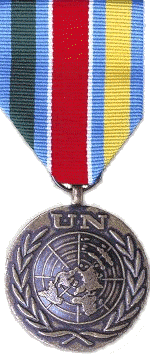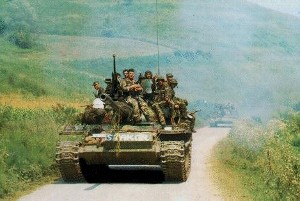|
UNITED NATIONS TRANSITIONAL ADMINISTRATION FOR EASTERN SLAVONIA, BARANJA AND WESTERN SIRMIUM (UNTAES) |
 |
|
|
KROATIË United Nations Transitional Administration for Eastern Slavonia, Baranja and Western Sirmium (UNTAES) Duur: 1 mei 1996 –
22 oktober 1997
Oost-Slavonië was het enige gebied dat de Kroatische Serviërs in de herfst van 1995 nog in handen hadden. Kroatië weigerde in te stemmen met het Dayton-akkoord zolang er geen regeling lag voor Oost-Slavonië. De presidenten van Servië en Kroatië sloten onder internationale druk op 12 november 1995 een akkoord. Oost-Slavonië zou onder het toeziend oog van een door de VN ingesteld overgangsbestuur op vreedzame wijze in Kroatië worden geïntegreerd.
De Veiligheidsraad besloot op 15 januari 1996 in resolutie 1037 de United Nations Administration for Eastern Slavonia, Baranja and Western Sirmium (UNTAES) in te stellen. UNTAES had onder meer tot taak het gebied te demilitariseren, de terugkeer van vluchtelingen en ontheemden te observeren en door haar aanwezigheid bij te dragen aan het handhaven van vrede en veiligheid in het gebied. De Veiligheidsraad besloot UNTAES eind 1997 geleidelijk af te bouwen.
De Nederlandse regering zegde op 12 april 1996 zes staffunctionarissen voor UNTAES toe aan de VN. Daarnaast was een F-27 van de Koninklijke Luchtmacht in Rimini beschikbaar voor medische evacuatie. Twee officieren werden desgevraagd als onderdeel van het UNTAES-liaisonteam bij het hoofdkwartier van IFOR en later SFOR in Sarajevo geplaatst. De vier andere Nederlandse militairen kregen een functie in de inlichtingensectie van het UNTAES-hoofdkwartier. De eerste militairen vertrokken op 1 mei 1996 naar Oost-Slavonië. De laatste Nederlanders keerden op 22 oktober 1997 terug. Bron: Ministerie van
Defensie |
|
|
Deelnemende landen:
33
|
 |
 |
 |
 |
 |
 |
|
Argentinië
|
Bangladesh
|
België
|
Brazilië
|
Denemarken
|
Egypte
|
 |
 |
 |
 |
 |
 |
|
Fiji
|
Finland
|
Ghana
|
Groot
Brittanië
|
Ierland
|
Indonesië
|
 |
 |
 |
 |
 |
 |
|
Jordanië
|
Kenya
|
Lithouwen
|
Nederland
|
Nieuw
Zeeland
|
Nigeria
|
 |
 |
 |
 |
 |
 |
|
Noorwegen
|
Oekraïne
|
Oostenrijk
|
Pakistan
|
Polen
|
Rusland
|
 |
 |
 |
 |
 |
 |
|
Senegal
|
Slowakije
|
Tjechië
|
Tunesië
|
Turkije
|
Verenigde
Staten
|
 |
|
|
|
Nepal
|
|
|
|
|
|
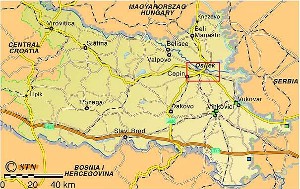 |
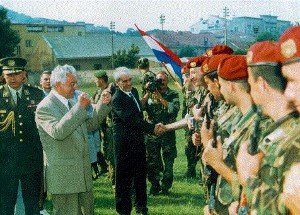 |
|
Kaart
Oost-Slavonië
|
Pres.
Tudjman inspecteert de troepen
|
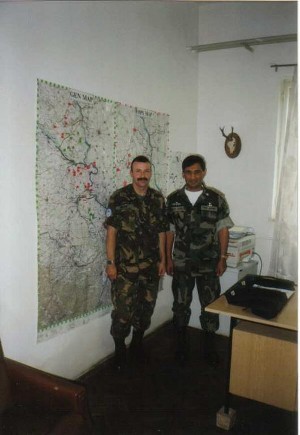 |
|
|
Majoor
F.M.Th.R. Müller, hoofd van het military intelligence office
van UNTAES met zijn Pakistaanse collega
|
|
RESOLUTIE 1037 UN The Security Council, Recalling its earlier relevant resolutions, and in particular its resolutions 1023 (1995) of 22 November 1995 and 1025 (1995) of 30 November 1995, Reaffirming once again its commitment to the independence, sovereignty and territorial integrity of the Republic of Croatia and emphasizing in this regard that the territories of Eastern Slavonia, Baranja and Western Sirmium are integral parts of the Republic of Croatia, Stressing the importance it attaches to full respect for human rights and fundamental freedom of all in those territories, Expressing its support for the Basic Agreement on the Region of Eastern Slavonia, Baranja and Western Sirmium (S/1995/951, annex), signed on 12 November 1995 between the Government of the Republic of Croatia and the local Serbian community (the Basic Agreement), Having considered the report of the Secretary-General of 13 December 1995 (S/1995/1028*), Stressing the importance it places on mutual recognition among the successor States to the former Socialist Federal Republic of Yugoslavia, within their internationally recognized borders, Desiring to support the parties in their effort to provide for a peaceful settlement of their disputes, and thus to contribute to achievement of peace in the region as a whole, Stressing the obligations of Member States to meet all their commitments to the United Nations in relation to the United Nations peace-keeping operations in the former Yugoslavia, Determining that the situation in Croatia continues to constitute a threat to international peace and security, Determined to ensure the security and freedom of movement of the personnel of the United Nations peace-keeping operation in the Republic of Croatia, and to these ends, acting under Chapter VII of the Charter of the United Nations,
Decides to establish for an initial period of 12 months a United Nations peace-keeping operation for the Region referred to in the Basic Agreement, with both military and civilian components, under the name "United Nations Transitional Administration for Eastern Slavonia, Baranja and Western Sirmium" (UNTAES); Requests the Secretary-General to appoint, in consultation with the parties and with the Security Council, a Transitional Administrator, who will have overall authority over the civilian and military components of UNTAES, and who will exercise the authority given to the Transitional Administration in the Basic Agreement; Decides that the demilitarization of the Region, as provided in the Basic Agreement, shall be completed within 30 days from the date the SecretaryGeneral informs the Council, based on the assessment of the Transitional Administrator, that the military component of UNTAES has been deployed and is ready to undertake its mission; Requests the Secretary-General to report monthly to the Council, the first such report to be submitted within one week after the date on which the demilitarization is scheduled to be completed pursuant to paragraph 3 above, regarding the activities of UNTAES and the implementation of the Basic Agreement by the parties; Strongly urges the parties to refrain from any unilateral actions which could hinder the handover from UNCRO to UNTAES or the implementation of the Basic Agreement and encourages them to continue to adopt confidence- building measures to promote an environment of mutual trust; Decides that, no later than 14 days after the date on which demilitarization is scheduled to be completed pursuant to paragraph 3 above, it will review whether the parties have shown a willingness to implement the Basic Agreement, taking into consideration the parties' actions and information provided to the Council by the Secretary-General; Calls upon the parties to comply strictly with their obligations under the Basic Agreement and to cooperate fully with UNTAES; Decides to reconsider the mandate of UNTAES if at any time it receives a report from the Secretary-General that the parties have significantly failed to comply with their obligations under the Basic Agreement; Requests the Secretary-General to report to the Council no later than 15 December 1996 on UNTAES and the implementation of the Basic Agreement and expresses its readiness to review the situation in the light of that report and to take appropriate action; Decides that the military component of UNTAES shall consist of a force with an initial deployment of up to 5,000 troops which will have the following mandate: To supervise and facilitate the demilitarization as undertaken by the parties to the Basic Agreement, according to the schedule and procedures to be established by UNTAES; To monitor the voluntary and safe return of refugees and displaced persons to their home of origin in co-operation with the United Nations High Commissioner for Refugees, as provided for in the Basic Agreement; To contribute, by its presence, to the maintenance of peace and security in the region; and Otherwise to assist in implementation of the Basic Agreement; Decides that, consistent with the objectives and functions set out in paragraphs 12 to 17 of the Secretary-General's report of 13 December 1995, the civilian component of UNTAES shall have the following mandate: To establish a temporary police force, define its structure and size, develop a training programme and oversee its implementation, and monitor treatment of offenders and the prison system, as quickly as possible, as set out in paragraph 16 (a) of the Secretary-General's report; To undertake tasks relating to civil administration as set out in paragraph 16 (b) of the Secretary-General's report; To undertake tasks relating to the functioning of public services as set out in paragraph 16 (c) of the Secretary-General's report; To facilitate the return of refugees as set out in paragraph 16 (e) of the Secretary-General's report; To organize elections, to assist in their conduct, and to certify the results as set out in paragraph 16 (g) of the Secretary-General's report and in paragraph 12 of the Basic Agreement; and To undertake the other activities described in the Secretary- General's report, including assistance in the coordination of plans for the development and economic reconstruction of the Region, and those described in paragraph 12 below; Decides that UNTAES shall also monitor the parties' compliance with their commitment, as specified in the Basic Agreement, to respect the highest standards of human rights and fundamental freedoms, promote an atmosphere of confidence among all local residents irrespective of their ethnic origin, monitor and facilitate the demining of territory within the Region, and maintain an active public affairs element; Calls upon the Government of the Republic of Croatia to include UNTAES and the United Nations Liaison Office in Zagreb in the definition of "United Nations Peace Forces and Operations in Croatia" in the present Status of Forces Agreement with the United Nations and requests the Secretary-General to confirm urgently, and no later than the date referred to in paragraph 3 above, on whether this has been done; Decides that Member States, acting nationally or through regional organizations or arrangements, may, at the request of UNTAES and on the basis of procedures communicated to the United Nations, take all necessary measures, including close air support, in defence of UNTAES and, as appropriate, to assist in the withdrawal of UNTAES; Requests that UNTAES and the multinational implementation force (IFOR) authorized by the Council in resolution 1031 (1995) of 15 December 1995 cooperate, as appropriate, with each other, as well as with the High Representative; Calls upon the parties to the Basic Agreement to cooperate with all agencies and organizations assisting in the activities related to implementation of the Basic Agreement, consistent with the mandate of UNTAES; Requests all international organizations and agencies active in the Region to coordinate closely with UNTAES; Calls upon States and international financial institutions to support and cooperate with efforts to promote the development and economic reconstruction of the Region; Underlines the relationship between the fulfilment by the parties of their commitments in the Basic Agreement and the readiness of the international community to commit financial resources for reconstruction and development; Reaffirms that all States shall cooperate fully with the International Tribunal for the Former Yugoslavia and its organs in accordance with the provisions of resolution 827 (1993) of 25 May 1993 and the Statute of the International Tribunal and shall comply with requests for assistance or orders issued by a Trial Chamber under article 29 of the Statute; Stresses that UNTAES shall co-operate with the International Tribunal in the performance of its mandate, including with regard to the protection of the sites identified by the Prosecutor and persons conducting investigations for the International Tribunal; Requests the Secretary-General to submit for consideration by the Council at the earliest possible date a report on the possibilities for contributions from the host country in offsetting the costs of the operation; Decides to remain actively seized of the matter. |
